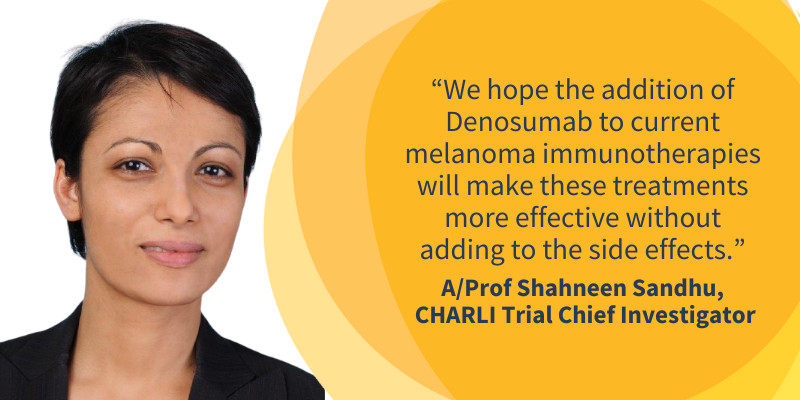A drug commonly used to treat prostate and breast cancer is being trialled in Bendigo to determine its effectiveness in treating melanoma, and more Bendigo residents with melanoma are being sought for the study.
A group of nine Bendigo Cancer Centre patients with metastatic melanoma (melanoma that has spread) are currently participating in the ‘CHARLI’ clinical trial, which is being coordinated by Melanoma and Skin Cancer Trials (MASC Trials).
The trial is examining whether the addition of the drug ‘Denosumab’ to standard immunotherapies used to treat metastatic melanoma will improve outcomes for these patients.
Chief Investigator of the CHARLI trial, Associate Professor Shahneen Sandhu, a Consultant Medical Oncologist with the Peter MacCallum Cancer Centre, said the outcomes of this trial could improve the treatment options for one of Australia’s most deadly cancers.
“We hope the addition of Denosumab to current melanoma immunotherapies will make these treatments more effective without adding to the side effects,” Associate Professor Sandhu said.
“If denosumab proves to be beneficial, the CHARLI trial may also provide data to support its addition to drugs for other tumour types,” she said.

The nationwide clinical trial aims to enrol up to 72 participants across 10 sites, with 50 patients recruited so far and is open for new patients to join until 31 December 2021.
Regional sites such as Bendigo are included in the trial to ensure a true representation of melanoma patients in the community and to provide regional residents with more equitable access to breakthroughs in medical care. Bendigo Health Cancer Centre joined the CHARLI Trial in 2019 and has been pivotal in representing regional Australia in the study.
“Regional patients have traditionally been under-represented in cancer clinical trials. As such, participation in the CHARLI trial has been fantastic for us to be able to offer our patients participation in a clinical trial whilst still getting treatment close to home. Our patients have been keen to participate to help improve treatment outcomes for melanoma patients in the future,” Dr Sam Harris, Medical Oncologist at Bendigo Cancer Centre, said.
Denosumab is a human monoclonal antibody that has been used for many years as part of breast and prostate cancer treatment. Melanoma research in animal models has shown that Denosumab can make immunotherapy drugs, such as ‘Ipilimumab’ and ‘Nivolumab’, work better at fighting metastatic melanoma.
CHARLI Trial participants receive either Nivolumab plus Denosumab or Nivolumab plus Denosumab plus Ipilimumab for up to two years. Treatment allocation is decided by the patient’s doctor based on clinical judgement and the patient’s overall health.
As part of the trial, Bendigo participants are required to visit to the Bendigo Health Cancer Centre, where they will receive the treatment and undergo regular measurements, blood tests and imaging (CT/MRI scans, PET scans). Patients may have tumour biopsies and are asked to provide optional saliva and stool samples.
Nivolumab, Ipilimumab and Denosumab all have potential side effects. These are listed in information provided to patients, and their doctor will discuss these with them in detail and answer any questions they may have.
If you are have metastatic melanoma and are interested in participating in the CHARLI Trial, email MASC Trials at charli@masc.org.au and visit the MASC Trials recruiting trials website page.

